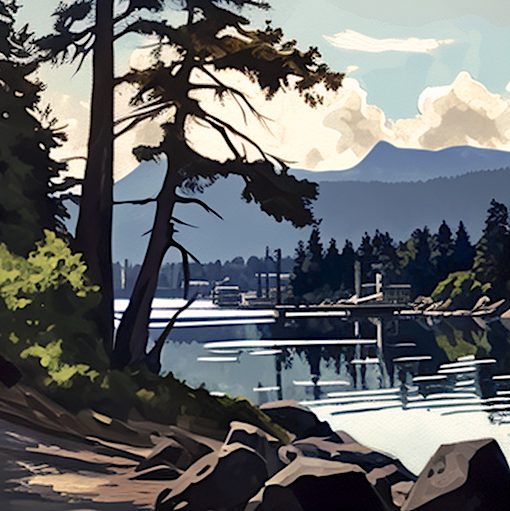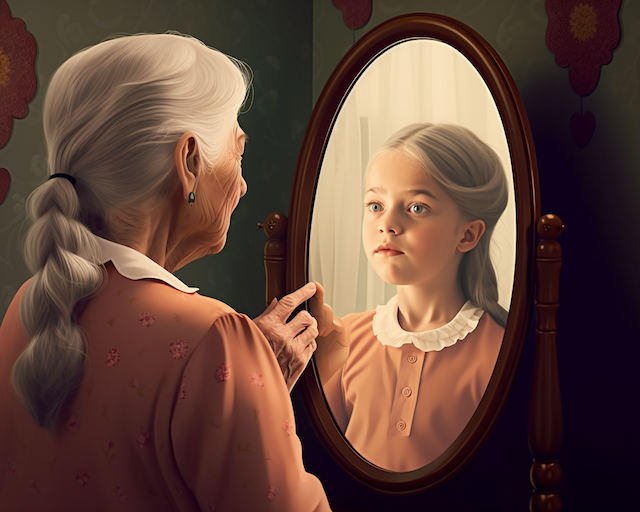This is #15 in a series of month-end reflections on the state of the world, and other things that come to mind, as I walk and hike in my local community. The walk described below is largely imagined, but it was based on real cues, things I saw on recent walks.

I used to build these buildings. I used to walk next to you.
Their shadows tore us apart, and now we do what we do.
Driven to the mountains high, sunken in the cities deep,
Living in our sleep.
I feel like going back,
Back where there’s nowhere to stay.
— Neil Young, Goin’ Back.
This body is taking me for a walk. I’m not crazy about the idea — I’d rather get my exercise over and done with by running for half the time I’d have to walk. But this body does not consult me on anything, much as might I pretend it does. Even to call this body “my” body is sheer conceit. It pays no attention to me, and I pay as little attention as possible to it.
These days I’m haunted. Ever since I coined the phrase “eight billion mildly deranged monkeys” to describe our species, I’ve started to see everyone in that guise. (Yes, I know we’re apes, not monkeys; I’m taking poetic licence.) I don’t mean the term disparagingly. We share 99% of our DNA with other simians, and we split genetically from chimps and bonobos just a million or two years ago, about 0.03% of the time there has been life on this planet. The very earliest simians date back ten times longer, still not more than a bat of Gaia’s eye.
And yet I’m endlessly astonished at what we humans can be conditioned to do, what we can get used to, so quickly, and accept as, well, acceptable, and even ‘normal’. We left the trees and the abundant tropical forests a million years ago, for this?
The word “sane” originally meant “in a healthy place”. By this definition, this place, and all the things I see around me — these concrete and steel buildings, these roads and cars that connect and disconnect us — are surely insane. Now we “sanitize” (make healthy, from the same root word) things by dousing them in antibiotic (“life-killing”) toxins.

As this monkey body walks toward the river trail, carrying me along rather reluctantly, it turns its gaze to a group of a dozen strangely dressed monkeys seated by the window of a coffee shop. They are not a tribe — they speak at least three mutually-incomprehensible languages and barely acknowledge those at the other tables.
Meanwhile, worker monkeys are doing their bidding and cleaning up after them. How were we all ever trained to do what we do? How do we make evolutionary sense of our species’ atomistic conditioning and massively destructive behaviour?
Just up the street, a work crew of six weary-looking monkeys in overalls with fluorescent vests, fixes holes in the road. They look as if they couldn’t imagine doing anything else.
I picture a bonobo, our closest cousin, mopping and sweeping the floors of an immense server farm, the infrastructure for a network of machines designed to amuse us to death. Could bonobos be conditioned to do this, day after day, with the right rewards? I ask Midjourney to imagine it, and it fails completely.
But I can imagine it. I remember the days when circuses featured animals ‘tamed’ into performing in grotesquely unnatural ways. I understand how and why our monkey species has been so easily domesticated, conditioned to see our ‘civilized’ society as a natural and desirable way to live. But I also understand that it could so easily have been otherwise — we might have evolved to appreciate the natural bounty of our world and live within its constraints, wild, free, raw, uninhibited, full on, as the bonobos did, and in a few secret places still do.
That possibility fills me with longing — a memory of what never was, but could have been.
As this body walks toward the ocean, from where we all came, the apartment towers and condos suddenly fade, and all that is left are small wooden structures. The roads and cars are gone and instead there are dirt tracks and horse-drawn carts. Walking back in time, the long way.
Such a relatively short time ago, as if it were yesterday, there were no strangers. Every body knew almost every other body within a week’s reach. As this body passes the body of an old female simian, there is a nod of acknowledgement, and then an invitation, from one body to another, to come inside for tea and biscuits.
This invitation cannot be refused, and as she leads this body into the kitchen, the female remarks about how she has aged, and how whenever she looks into a mirror, she still sees herself as she always has, as young, and strong, as a child, filled with wonder.

She describes the culture she grew up in, how she was conditioned to be something other than what she might have naturally been. Still, she says, there are no regrets.
This body helps her move a piece of furniture too heavy for any single creature to manage, and then it is off again, on its way backwards, toward the sea, into the past, like the cliché silhouettes of humans’ evolution from earlier apes, except in reverse.
Now even the dirt tracks are gone, and all that stretches ahead is an immense plain with mountains beyond it.
Still, there are no strangers. There is another female simian, wondrously attired, ahead of us (this body and I), looking at the mountain. She is dancing, performing some ancient ritual, passed down through many generations. As this body approaches, it hears her singing.

This body watches the dance, respectfully, appreciatively. When it has concluded, it reaches into its pack, draws out a small box, and, bowing, offers it to the dancer as a gift. The gift is likewise acknowledged, but it was not what the dancer had hoped for, was yearning for. Her expression conveys thanks, and disappointment.
A rough trail appears, and this body bids farewell to the dancer and follows it as it curves toward the gathering darkness and into a deep, warm, enveloping green forest. This body relaxes, as if it has, perhaps, at last, found its way home. I on the other hand, grow quickly and needlessly uneasy.
In a clearing, there is a tribe, a small one, mixed-gender, six simian bodies seated in a circle. There is the passing of a bowl in one direction, from which each body drinks, and the passing of a pipe in the opposite direction. One of the six members of the tribe seems to be its alpha — a female with a strong face and a myriad of tattoos. She nods to this body, and the hand and facial gestures of the tribe suffice to offer a clear and articulate greeting, but not necessarily an offer to join them. The response is left to this body — either an entreaty to sit and share with them, to be their guest, or an appreciation and indication of intention to continue traveling. This body signals the latter.
I have no say in the matter.

I have forgotten how to be a part of a tribe. There is a desire to be part of one, but also a great anxiety about what would have to be given up, the cost to my lonely autonomy of being part of a group and subordinate to it. I’m not sure there is even a path back toward that sense of belonging. We have strayed too far, and forgotten the way home.
My sense is that we might find that path, but we will, most of us, only do so when we must, when we have no other choice. When the state of our civilization becomes sufficiently precarious, even perilous, that we realize, instinctively, that we can no longer make it alone. That is terrifying, and, I would guess, it is not that far off now. There is something momentous happening here, and everywhere.
This body journeys on, into the dark forest. It is warm, welcoming, but I am weary, feeling too much alone, too much too often inside my head, and I sense that this body is weighed down by my sadness.
A sadness for that which has never been lost. But it seems, to me at least, something so far away, so unreachable, now.
The forest opens onto a profusion of lights, a town. This body knows where it is going, and soon it has made its way to the local train station, and onto the train to its temporary, precarious home.

It is raining now. There is nothing to be done. This body rides the elevator to the strange terrace in the sky where it resides, for now, and stares out the window at a miniature universe of lights, a startling display of hope, of determination, of disconnection and clinging to what once seemed the best course of action, the way of progress. This beautiful, terrible world that we had no choice but to build.
In the window’s reflection, I see this body’s face, a face that I call ‘mine’, an old man’s face, a child’s face, the face of a grizzled ape. A look of bewilderment and wonder, of despair and astonishment.
I see, perhaps, some nascent signs of equanimity in this still-simian visage, something new, born of curiosity, of playfulness, of compassion, of acceptance. This is not where, or how, I thought I’d be, now.
But it is enough. All that any ape could ever ask for.
All of the images in this post were made by Midjourney, the visual AI tool. None of them is from my own prompts.





“We have strayed too far and forgotten the way home”.
I guess that ever since we got the “unsolicited gift” of too much consciousness we became a species that realized that we do not belong here. It’s the source of immense sadness and unhappiness. We long to go back to a happier time, when we felt at ease in the natural world or even transcend our current human condition.
Only there never was a real fixed home to go back to. It’s an illusion that our mind creates to find an anchor of stability for our restless soul.
All there is, is the endless creation of useful forms to help disperse whatever energy gradients are accessible. What we, as conscious forms, think of our evolutionary predicament or how much we yearn for a better deal in life is irrelevant in this pointless universe. As Albert Camus so poignantly stated “There is no remedy”.
The power of desire; where do we direct it ?
or is it like AI,
directing itself ?
Who am I ?
Thanks Dave